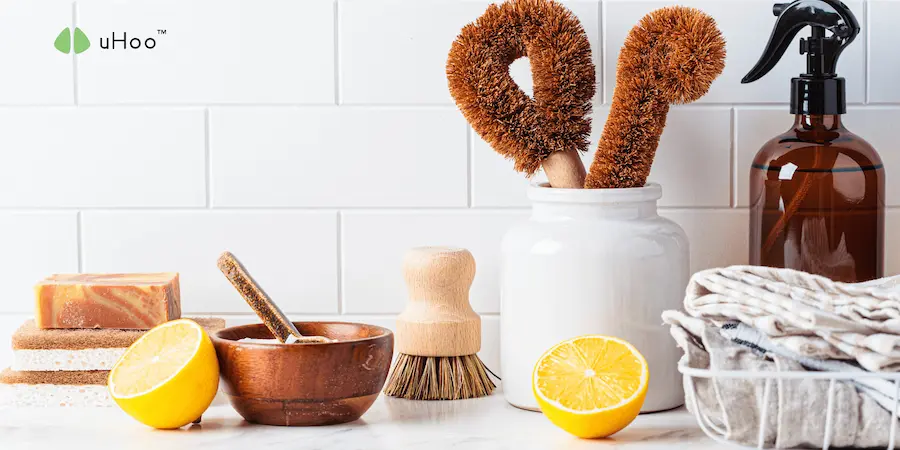Creating a healthy home environment goes beyond surface cleanliness. The air we breathe plays a crucial role, and choosing natural cleaners is a powerful way to enhance indoor air quality (IAQ). Let’s explore the diverse world of natural cleaning agents, each offering unique benefits.
-
Vinegar: The Versatile Disinfectant and Deodorizer
- What it is:
- White distilled vinegar is a mild acid that effectively cuts through grease, dissolves mineral deposits, and disinfects surfaces.
- How it works:
- Its acidity disrupts the cell membranes of bacteria and mold, making it a powerful cleaning agent.
- Uses:
- All-purpose cleaner: Dilute with water for general cleaning.
- Glass cleaner: Mix with water for streak-free shine.
- Deodorizer: Neutralizes odors in kitchens and bathrooms.
- Descaling: Removes mineral buildup from faucets and showerheads.
- Important Note:
- While vinegar disinfects some bacteria and mold, it’s not a substitute for stronger disinfectants in cases of serious contamination. Also, don’t use it on natural stone surfaces, as its acidity can cause damage.
-
Baking Soda: The Gentle Abrasive and Deodorizer
- What it is:
- Baking soda, or sodium bicarbonate, is a mild alkaline substance with gentle abrasive properties.
- How it works:
- It lifts dirt and grime, neutralizes odors, and gently scrubs surfaces without scratching.
- Uses:
- Scouring powder: Sprinkle on surfaces for gentle scrubbing.
- Odor absorber: Place an open box in the refrigerator or closet.
- Drain cleaner: Mix with vinegar for a natural drain cleaner.
- Carpet deodorizer: Sprinkle on carpets before vacuuming.
-
Lemon Juice: The Natural Degreaser and Disinfectant
- What it is:
- Lemon juice is highly acidic and contains natural antibacterial and antiseptic properties.
- How it works:
- Its acidity cuts through grease, disinfects surfaces, and leaves a fresh scent.
- Uses:
- Degreaser: Cuts through grease and grime on kitchen surfaces.
- Disinfectant: Kills bacteria and mold on countertops and cutting boards.
- Stain remover: Removes stains from fabrics and surfaces.
- Brass and copper cleaner: polishes these kinds of metals.
- Important Note:
- Like vinegar, lemon juice can damage natural stone surfaces.
-
Essential Oils: The Aromatic Cleaners and Disinfectants
- What they are:
- Essential oils are concentrated plant extracts with potent antibacterial, antifungal, and antiviral properties.
- How they work:
- They disrupt the cell membranes of microorganisms, making them effective disinfectants.
- Uses:
- Disinfectant: Add a few drops to cleaning solutions.
- Air freshener: Diffuse essential oils for a natural fragrance.
- Mold inhibitor: Tea tree oil is particularly effective against mold.
- Cleaning solution enhancements, to add a desired aroma.
- Important Note:
- Always dilute essential oils before use, and choose high-quality, pure oils.
-
Castile Soap: The Gentle and Versatile Cleaner
- What it is:
- Castile soap is a vegetable-based soap made from olive oil or other plant oils.
- How it works:
- It effectively cleans a wide range of surfaces without harsh chemicals.
- Uses:
- All-purpose cleaner: Dilute with water for general cleaning.
- Hand soap: Gentle and effective for handwashing.
- Laundry detergent: Add to laundry for gentle cleaning.
- Dish soap: works well for washing dishes.
For the best results, consider using these natural cleaners in conjunction with an uHoo air quality monitor. This combination allows you to not only clean effectively but also track the impact of your cleaning choices on your indoor air quality, ensuring a truly healthy and balanced home.



